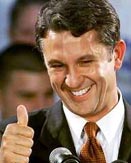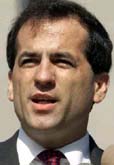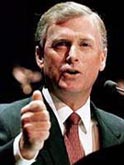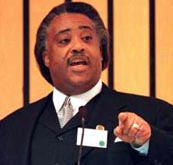
MUGGER
http://www.jewishworldreview.com -- EVERY YEAR, usually by happenstance, the New York Press Best of Manhattan manifests a certain theme that can be detected by even the most casual reader. In the 2000 edition that theme is The New York Times, a newspaper that's so out of touch with the mainstream that every day a new journalistic horror is foisted upon the people of New York, as well as readers across the country. There are two enduring cliches about the Times that are mindlessly repeated by members of the media and citizens of Zabar's Nation. The first is relatively benign: the Times' nickname remains "The Gray Lady."
Obviously, that's no longer literally true, as the paper has been sufficiently modernized to include process-color photographs, charts and illustrations. As Paul Weller sang many years ago, that's entertainment-just a function of the marketplace. Dig deeper, however, and think of what the adjective "gray" conveys: the idea of a serious, even intellectual, newspaper, where words matter more than flashy pictures or screaming headlines. I'd argue that the Times is no longer interested in printing articles that don't conform to its management's peculiar dogma; that, in fact, over the past 15 years, but particularly since Arthur Sulzberger Jr. began his tenure as publisher, the paper has become anti-intellectual, often in the extreme.
The second cliche is more exasperating: The Times is still glorified, often by itself, as the United States' "paper of record." I ask, the "record" of what and whom? Despite the feeble pretense that, aside from the editorial pages, the Times' contents are "objective," that's-objectively speaking-not the case. As I've written before, if the Times declared its political and social intentions-as does The Wall Street Journal, the New York Post and London's Guardian and Daily Telegraph, to name just a few-the elitist, left-wing slant that informs the daily would be no less noxious, but far more truthful. Instead, the Times operates from a limo-to-limo mindset. Reading the paper, it's clear that the reporters, columnists and editorialists wouldn't deign to dine, bowl or share a drink with the salt-of-the-earth people who are propped up, and condescended to, in their pages. Nevertheless, the Times cabal knows what's best for New York City and indeed the entire nation. In this way, the Times' worldview is just as fraudulent and out-of-touch as the Clinton administration's: say anything, write anything and do anything to retain power.
It's no accident, for instance, that the Times, along with several other media outlets, endorses the ideologically bankrupt concept of campaign finance reform. Because the Times is a liberal newspaper, a virtual satellite of the Democratic National Committee (unlike The Washington Post, which is far more even-handed in its coverage, despite sharing many of the same political goals as its New York competitor), it calls for the abolition of so-called "soft money." In the unlikely case that such legislation, which is clearly a violation of the First Amendment, is ever enacted, who would benefit?
It wouldn't be the rare individual who contributes to political campaigns. Remember that donations are limited to $1000 per campaign, a figure that was set in the post-Watergate 70s and has never been adjusted for inflation. And, if the Times' desire for the Democrats to retain the White House and take back control of Congress is fulfilled this November, you can bet that while certain corporations and institutions like the NRA will be shut out, the powerful unions and trial lawyers' lobby will somehow be exempt. But, most significantly, this dismantling of traditional American democracy would mostly grant more influence to-the media.
As levelheaded scholars point out, usually to little effect, such legislation would've made it impossible for Eugene McCarthy, bankrolled by wealthy patrons, to mount his historic primary challenge to President Lyndon Johnson in 1968. McCarthy's insurgent campaign, which led to Robert F. Kennedy's entry into the Democratic race, turned the political landscape upside down. Many of the same people who cheered when Johnson subsequently abandoned his reelection plans now insist that the McCain-Feingold reform bill is perhaps the most important issue that faces the country today. But as the polls reflect, most Americans couldn't care less. Don't forget that one of the most popular presidents of the 20th century was John F. Kennedy, and his drive to the White House was funded by his father's bootlegger money and cash donations from the mob.
Ultimately, despite the myopic and self-interested view of the elite media, citizens don't really care about the money that's spent in a presidential campaign. They want a person who's likable and concerned about their wallets, who doesn't have an itchy trigger finger and who-especially now, in light of the past eight years-is morally presentable. It might be as simple as this: which candidate is more likely to rush into a burning house to save your family? In the 2000 contest-and I digress here-I'd wager it would be Gov. Bush who would instinctively take action, while Al Gore might dilly-dally as he considers the political implications.
 |
| Lazio |
Lance Morrow, a veteran Time essayist, offered this opinion in the weekly's Sept. 25 edition: "In my right ear I hear the concussive blasts of Limbaugh. With my left eye I read the New York Times, the curia and house organ of America's new established church-the church of correctness and diversity, with all its rigid doctrines now embedded in the rules of corporations, of government, of universities."
A SPECIFIC EXAMPLE of how the Times-never considered a conservative newspaper, especially in the past 50 years-has morphed into an organ of unblinking, effete liberalism is the coverage of two U.S. Senate races in New York: Robert F. Kennedy vs. Kenneth Keating 1964 and Hillary Clinton vs. Rick Lazio in 2000.
There are similarities: Kennedy, like Clinton, was ostracized as a "carpetbagger"; both were relatives of a U.S. president; and each was suspected of using the Senate seat as a political stepping-stone.
Yet while the Times has lovingly embraced Clinton's candidacy-again, to the point of cheerleading-the paper was adamantly opposed to Kennedy, and endorsed his rival that autumn. The editorialist wrote that Kennedy (who as his brother's attorney general had a far more impressive resume than Clinton has) stirred "an uneasiness that is no less real because it is illusive and difficult to define."
In the '64 campaign, according to RFK biographers Evan Thomas (Robert Kennedy: His Life) and Jeff Shesol (Mutual Contempt), the Times was relentless in its opposition to Kennedy, using editorial headlines like "Kennedy Blitzkrieg." The paper wrote in August of that year: "Mr. Kennedy, in frantic need of a new launching pad for his political fortunes after President Johnson blackballed him as the Democratic Vice Presidential nominee, simply moved into a vacuum... In characteristic fashion, he did not wait to be asked. With the aid of his political field marshal, brother-in-law Stephen Smith, he set in motion a steamroller that flattened the party's bemused state leadership into a doormat bearing the legend, 'Welcome, Bobby.'"
Thomas writes: "Very thin-skinned around reporters and editors he couldn't easily manipulate, Kennedy developed a lifelong resentment of the Times. He groused that the editors' idea of a good story was 'More Nuns Leave Church.'" RFK also said, after the Times continued to badger him after his defeat of Keating, that "Anti-Catholicism is the anti-Semitism of the intellectuals."
| Sulzberger |
But today, under Baby Boomer Sulzberger and his lackeys, it's a new dawn, an easy-listening rock 'n' roll political world. Is there any doubt that the Times, later this fall, will endorse Mrs. Clinton, a candidate who's never held an elected or a non-honorific appointed office, and whose ethical misadventures-from those missing legal documents to White House and Camp David sleepovers for campaign contributors-would eliminate any other aspirant from the paper's consideration?
And never mind that Kennedy's brother was a martyred president who was still, at that time, held in almost saintlike regard by New Yorkers, as opposed to Clinton's husband, the only impeached president of the 20th century. What's important to Sulzberger is that Hillary Clinton, in addition to designing the failed healthcare legislation of 1993 that would've handed over one-seventh of the U.S. economy to the government, is considered a tireless advocate for, in current parlance, "the children."
A Sept. 19 Times "news" article by Dean E. Murphy, headlined "Mrs. Clinton Portrays Lazio as Bully and Derides His Tax Plan," is typical of the blatant favoritism the paper shows to the resume-light First Lady who's running against a four-term congressman. Murphy writes: "At ease in a Manhattan hotel ballroom filled mostly with Democratic women, Hillary Rodham Clinton yesterday made a broad appeal for women to support her Senate campaign, casting her Republican opponent Representative, Rick A. Lazio, as a bully in last week's debate and dismissing his tax plan as misleading and mathematically unsound."
Two days later, Adam Nagourney contributed his own slant: "Voter attitudes toward Rick A. Lazio have turned markedly more negative since June, with suburban women now moving solidly toward Hillary Rodham Clinton and many New Yorkers saying Mr. Lazio came across as harsh and inexperienced in his debate with Mrs. Clinton last week, according to the latest New York Times/CBS News poll."
(It should be noted that, on the same day, the nonpartisan Marist Institute Poll showed a dead heat, with Clinton and Lazio tied at 44 percent among likely voters, as opposed to the 9-point advantage given to Clinton in the Times survey. In addition, like Newsweek polls, Times/CBS polls are often suspect: For example, a Times poll released on Nov. 4, 1996, the day before the presidential election, showed President Clinton with a 16-point lead over GOP challenger Bob Dole. Twenty-four hours later, Clinton indeed defeated Dole, but by a margin of only 8 points.)
 |
| Dole |
The Times has milked the alleged "bully" debate tactics of Lazio consistently since the candidates' Sept. 13 exchange in Buffalo. As usual, Mrs. Clinton insists on having it all. She claims the campaign should be about the "issues," but then complains when confronted by an aggressive challenger. Unfortunately, it's this kind of behavior, encouraged by the Times, that lessens the probability of there being a female U.S. president in the near future.
It's true that Lazio's walk over to Clinton's lectern with a "no-more-soft-money" pledge was a gimmick; that's politics. But imagine how a secure woman like Margaret Thatcher might've reacted to the situation. Instead of acting stunned and fragile, I'd wager that Thatcher would've examined Lazio's piece of paper, grandly declared the contents "pure rubbish" and then ripped the paper in two.
Nagourney, in a Sept. 25 "Campaign Memo," openly despaired that Clinton had struck a deal with Lazio on soft money advertising. (It's too early to predict whether that agreement will stick; my guess is that it'll unravel in a week or two.) The Times reporter doesn't attempt to mask his advocacy for Clinton, writing: "Still, it would seem that Mrs. Clinton has suffered some self-inflicted and perhaps unnecessary damage in trying to clear this particular table. Her aides did not seem to notice when the subject shifted from Mr. Lazio's manners in aggressively demanding at their debate that she sign a soft-money ban, which clearly helped the first lady, to the merits of the ban itself, which seems to have benefited Mr. Lazio."
In one of the paper's most appalling double-standards displays this year, an Aug. 30 editorial argued that independent counsel Robert Ray's Whitewater report shouldn't be released before the election. "If Mr. Ray cares at all about his credibility," the paper whined, "and about whether the public sees his report as an objective document or a time bomb lobbed at Mrs. Clinton's campaign, he will delay it until after the election." As it turned out, Ray's findings were made public, and the First Lady was cleared of any criminal activity.
 |
| Ray |
Eight years ago, however, as John Steele Gordon pointed out in the Aug. 31 opinionjournal.com, the Times felt differently about political "interference." Three days before the '92 election, Iran-Contra independent counsel Lawrence Walsh issued an indictment of former Defense Secretary Caspar Weinberger and questioned President Bush's involvement in the scandal. Six days after Bush was defeated by Bill Clinton, an editorial "notebook" piece by John P. MacKenzie said: "Could Mr. Walsh have postponed the indictment past the election? Yes, but his office had promised it by the end of October under a demanding court timetable... If Lawrence Walsh had suppressed this information, the public would be justifiably angry. Angry enough to wonder why we bothered to have an independent counsel."
The worst, to be sure, is yet to come. The Times' inevitable twin endorsements of Hillary Clinton and Al Gore are bound to set a new standard for pandering to the masses, extolling both candidates for their populist promises. Then, the 9-to-5 grind completed, Sulzberger's team will be ferried to their country houses, smug in their learned recommendations to, and for, the great unwashed.
THE TIMES' unacknowledged partisanship is spread throughout its pages. On the subject of George W. Bush, all hands at the paper are allowed, most likely encouraged, to distort everything from the GOP presidential nominee's record in Texas to his proposed Social Security overhaul to his verbal bloopers. (Bush might have trouble pronouncing "subliminal," but unlike his opponent Al Gore, he's not prone to misleading self-aggrandizement or exploitation of family tragedy for political gain. You make the call.)
On Sept. 16, political beat reporter Frank Bruni was unabashed in his low opinion of Bush. Concluding an article that derided the Governor for "holding his own in the reinvention sweepstakes," Bruni referred to Gail Sheehy's vile Oct. Vanity Fair profile in which the 1970s-psychobabble refugee asserted, with little evidence, that Bush is afflicted by dyslexia. Bruni writes: "Mr. Bush has laughed off that theory and did so on this occasion by pointing out how little contact he had had with the writer of the Vanity Fair article, Gail Sheehy. 'The woman who knew that I had dyslexia. I never interviewed her,' Mr. Bush said. He did not appear to be making what would have been an incredibly clever joke."
A Sept. 21 article by Steven Lee Myers, headlined "Gore's Service Does Not Keep Vets From Bush," was biased from its first paragraph to the 30th. He began: "Al Gore enlisted in the Army and went to Vietnam. George W. Bush joined the Texas National Guard and did not. But for many people in uniform, that makes little difference. It is Mr. Bush, not Mr. Gore, who seems to enjoy some automatic credibility with the military because of his party affiliation, his policy positions, his running mate, his advisers and his father."
It must frustrate Sulzberger that while his newspaper might set the agenda for the self-satisfied cognoscenti, his influence within the military isn't as pervasive.
| Carter |
Richard Berke, considered the Times' star political reporter, isn't a stickler when it comes to facts. A Sept. 17 article, headlined "A Political Rarity: Seven Weeks of Maybe," was about the potential closeness of the Bush-Gore race. Berke wrote: "In mid-October of 1980, polls suggested that Mr. Reagan's support was leveling off and that Mr. Carter was on the rise. That led Robert Strauss, Mr. Carter's campaign manager, to say to a reporter at the time, 'I sleep like a baby these nights.' Not too long after that comment, Mr. Reagan began to gain ground. He won with only 50.8 percent of the vote. The Kennedy victory was even more of a squeaker: 50.1 percent."
Berke's reporting is misleading. Yes, Reagan took 50.8 percent of the vote in '80, but he smashed Carter, who won just 41 percent. Berke omits independent candidate John Anderson's share that year, as well as the votes for fringe candidates. Reagan's victory was a landslide. In addition, the correct totals of the JFK-Nixon race in '60 were 49.7-49.6 percent of the vote.
Op-ed columnist Paul Krugman-who rarely misses an opportunity to blast the sound fiscal policy of lowering taxes-was typical in his derision of Bush in an Aug. 16 essay. Read one Krugman column and you've read them all, but on that summer day he wrote: "America's economic miracle-which Bill Clinton claimed as vindication in his Monday [Democratic convention] speech, but George W. Bush insists was an act of God-didn't begin when Mr. Clinton took office in 1993. And no, it didn't begin with Ronald Reagan either."
One of Krugman's op-ed mates, Bob Herbert, contributes to the Times' disintegration in his own ham-handed way. On Aug. 24, he wrote: "Education is one of the hot issues in the presidential campaign. All the candidates are in favor of enhanced student achievement, tough standards, rigorous testing. And all agree that steps have to be taken to improve the performance of black and Latino students. No one wants school kids to grow up spelling like Dan Quayle." I'm sure that absurd slur provoked much merriment in the Times' mess hall, but this is a fact: the United States should be so lucky that its students, often taught by barely literate union-protected teachers, were able to spell, or think, as well as Dan Quayle.
 |
| Quayle |
Some Times pundits, such as Frank Rich, apparently feel that Bush is unfit for the presidency because he's not as "with it" as Deadheads Al and Tipper Gore. Even though Bush hasn't threatened the entertainment industry with censorship, as Gore and Joe Lieberman have-the square Governor believes it's up to parents to monitor their children's viewing and listening choices-Rich is unimpressed. Last Saturday, he said: "You almost have to feel for Mr. Bush. A man who by his own admission loved 'Cats' and hasn't been to a movie theater in years, he is not exactly a slick show-biz hand."
But who says the Times is elitist?
You might remember all the media hand-wringing over Bush's "vulgar" characterization of Times reporter Adam Clymer on Labor Day. Clymer, Bush said to runningmate Dick Cheney, unaware that he was before a live microphone, was a "major-league a-hole." I suspect that that was the beginning of Bush's comeback in the topsy-turvy polls-as this is written, Gore's lead in the national polls has been erased-but Clymer's compatriots acted stunned, as if they'd never heard, or uttered, the word "asshole" before.
If the Times considered Bush's insult such an affront, you'd think Clymer would've been recused from writing further stories about the Governor, but that wouldn't fit into the paper's overall agenda. On Sept. 17, for instance, Clymer wrote a long piece on the race, detailing Gore's increasing lead in the Electoral College count. In 10 days or so, when the state polls, which are conducted less frequently than national surveys, are released, we'll see if Clymer writes a follow-up.
As for obscenity, according to a Sept. 15 New York Observer editorial, the Times' Los Angeles bureau chief Todd Purdum could give Bush a few pointers. During the Democratic convention, Purdum hosted a party at his house; the guest list included not only Times colleagues, but also Hollywood entertainers and Clinton officials. Considering the event newsworthy, Observer media reporter Gabriel Snyder-admittedly a crummy one-called Purdum for an invitation. The Timesman, who, in the now-accepted but still unseemly Beltway tradition, is married to former Clinton press spokeswoman Dee Dee Myers, said to Snyder: "This is my...house and you are not coming and you can shove your head up your ...!"
As always, the Times stands as a Jesse Jackson/Al Sharpton-certified defender of affirmative action. One of the silliest assertions of the necessity of quotas came in a Sept. 5 editorial called "Technology's Gender Gap." It read, in part: "The barriers that keep minorities from enjoying full access to the technological revolution have been widely commented on. Less talked about is another 'digital divide,' the fact that fewer women are entering today's booming technology fields...
 |
| Sharpton |
"Because the industry serves the broader needs of society, the technology workplace ought to reflect the interests of both men and women. The technology industry badly needs more workers. Women represent a major untapped source of talent that could solve the shortage."
I swear, the above actually was a Times editorial, and not a plank in the Democratic party platform. It seems odd that the paper, which wholeheartedly supported the Clinton administration's persecution of Microsoft-and by extension of other technological companies that were built by entrepreneurs and have created a massive number of jobs-is so concerned about the well-being of that industry. But given the opportunity to interfere, in lockstep with a government that has no understanding of the field, a-huntin' the Times will go.
It's particularly galling when the paper's editorialists play prole for a day and attempt to convey the feelings they no doubt believe their readers are incapable of. A July 23 toss-off, "Hamptons Serenade," poked fun at the celebrities and wealthy New Yorkers who migrate east each summer and cause horrific traffic gridlock as well as provide grist for gossip columns. There's a stench in the final two sentences of the piece, perhaps because they encapsulate so neatly the entire falsity of the Times' ethos: "To most of us, there is something almost soporific in the sound of millionaires whining at the edge of the ocean. It is the sound of summer, a sound as characteristic of the season as crickets keening in the high grass."
FINALLY, there was the Sept. 24 edition of the Times, which was strewn with biased and misleading information. In the Times Magazine, an article about late-night tv comics and their role in politics was headlined "The Stiff Guy vs. the Dumb Guy."
On the editorial page, there's a flabbergasting, if predictable, valentine to Joel Klein, the outgoing Justice Dept. bad-ass who did his best to screw up free enterprise in this country. The Times calls upon its readers to show gratitude for Klein's dangerous and antiquated antitrust enforcement.
Another editorial calls for universal healthcare, and claims that even populist-when-convenient Al Gore isn't doing enough to fulfill Hillary Clinton's disastrous plan of 1993.
In the news section, Richard Berke is about 10 days late with a story about GOP infighting, especially in the unexpected battleground state of Florida. Without citing a single pollster by name, Berke writes: "And now with only six weeks remaining, Republicans face polls showing a dead heat in Florida."
But Berke is a prophet compared to Nicholas D. Kristof, who contributes yet
another front-page profile of George W. Bush. In this installment, Kristof
reports that Bush is a lifelong baseball fan, was an owner of the Texas Rangers
and reaped an enormous profit when the team was sold. That Bush's entire
business career, as well as his lackadaisical collegiate years, have been the
subject of hundreds, probably thousands, of articles in the past two years,
isn't germane. With six weeks until Election Day, The New York Times is working
JWR contributor "Mugger" -- aka Russ Smith -- is the editor-in-chief and CEO of New York Press (www.nypress.com). Send your comments to him by clicking here.

